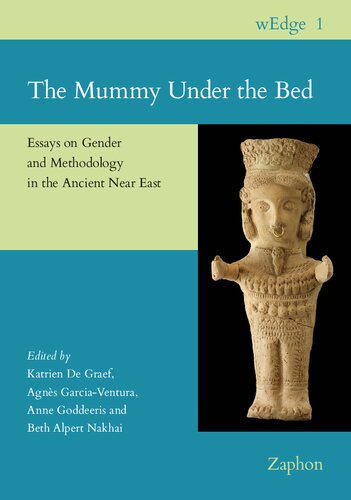Product desciption
The Mummy Under The Bed Essays On Gender And Methodology In The Ancient Near East Wedge 1 Katrien De Graef Editor by Katrien De Graef (editor), Agnes Garcia-ventura (editor), Anne Goddeeris (editor), Beth Alpert Nakhai (editor) 9783963270888, 3963270888 instant download after payment.
The present volume contains 17 contributions devoted to various methodological approaches to gender studies within the broad field of Ancient Near Eastern studies, including ancient history, archaeology, art history, Assyriology, Phoenician-Punic studies, and biblical studies. This collection is the result of presentations, exchanges, and discussions that took place during the "Third Workshop on Gender, Methodology, and the Ancient Near East" (GeMANE). Scholars explored new methods for addressing gender-related topics by sharing ideas, research results, and ongoing projects. Their results were further elaborated and, together with new chapters, bundled into the present volume. Building on the previous workshops, GeMANE 3 has thereby created a platform to present, examine, and discuss innovative methodological and theoretical approaches to gender within the broad framework of Ancient Near Eastern studies. Over the last several decades, gender studies has claimed its rightful place within Ancient Near Eastern studies. After the initial and sorely needed retrieval of women's lives utilizing textual and archaeological sources, new methodological and theoretical approaches to gender and sexuality now complement descriptive studies. Going forward, GeMANE remains fully committed to opening up all possibilities inherent within (post-) feminist, masculinist, structural, queer, and related theories. Also fundamental are innovative (digital) methodologies for historical, art historical, archaeological, and philological subjects within Ancient Near Eastern studies. The content of this volume is structured in four thematic sections. The first section, "Reading Against the Grain," is devoted to studies in which dominant readings of both textual and archaeological sources are questioned and alternative, resistant readings are offered. The second section, "Cult and Cults," contains contributions on the role of women and feminine identity in cult, and on (en)gendered spaces in religion and mythology. The third section, "Ancient Beauties," includes chapters on divine fragrance, beautification practices, bodily adornment, and binary gender stereotypes. The fourth section, "Networks and Powers," contains contributions on the role of women and female networks in economy and society, and on the application of Social Network Analysis. But first and foremost, the introductory chapter is devoted to the memory of women in Ancient Near Eastern studies.


